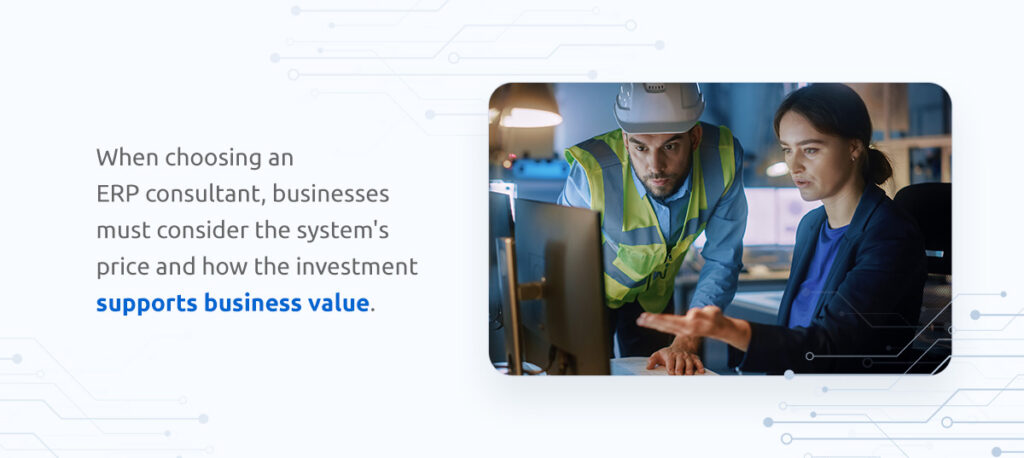
As your business grows, it will reach a point where spreadsheets, legacy systems or disconnected processes are holding you back. When it is time for a change, companies in manufacturing, distribution and metals can benefit from implementing an enterprise resource planning (ERP) system.
However, choosing an ERP system alone won’t solve your problems. Your business needs a trusted leader to guide the process. ERP implementation consultants with industry insights and technical acumen can align your team, streamline your workflow and provide long-term business value.
Learn how to choose an ERP consultant in this guide.
The right consultant will help your business optimize operations and improve your bottom line. Explore the characteristics to look for when partnering with an ERP consultant below.
The best ERP consultant for your business will understand how to streamline implementation and have the technical skills to support a smooth transition.
Look for the following skills when choosing a consultant:
The best ERP consultants have repeatable frameworks, project governance and accountability. Below are key elements of a proven methodology:
An experienced ERP consultant understands how businesses like yours function. This could include understanding what a real production timeline looks like or how supply chain instability may impact your operations. It also means they’re already familiar with the regulatory and compliance challenges that may arise in your sector.
Besides surface-level knowledge, your consultant should understand how to handle feature prioritization and workflow optimization challenges. A track record of success also means they’ve already helped companies modernize legacy systems and guided firms through rollouts. They’ll understand best practices for deploying in phases, managing go-lives or switching out outdated systems for one consolidated solution.

When choosing an ERP consultant, businesses must consider the system’s price and how the investment supports business value.
A reputable consultant doesn’t position themselves as the cheapest but as the most impactful. They’ll work with you to determine where the system might drive measurable results and how these improvements will pay off. For example, they’ll help you understand how the system may reduce inefficiencies that cost you time and labor or how better visibility into your operations helps you make more confident decisions.
Additionally, a good consultant sets realistic expectations. They won’t try to impress you with speed at the expense of long-term performance. They break the process into clear, manageable phases.
Every company is on a different path. Some may be preparing for growth, while others want to optimize a few processes. A great consultant takes the time to understand your workflows, pain points and performance metrics. They listen to your needs and create custom solutions for your bandwidth and aspirations.
When a consultant understands your business, they’re better equipped to share recommendations for streamlining operations. Their insights should be built on trust and context, so your team feels comfortable adopting changes.
The best ERP consultants look for tools, technologies and strategies to improve businesses’ operations. They bring insights about automation, artificial intelligence and predictive analytics and help you integrate the tools that fit your context.
The best consultants are clear communicators. They simplify complex system jargon into the language your team can understand. Additionally, they never assume your priorities without confirmation.
Good communication may look like the following:
When communication flows, your teams will likely feel more engaged in the process and less likely to resist the transition to ERP systems.
Your business needs someone who respects your organization’s values, understands how your team works and can operate within that environment. The right consultant may offer fresh perspectives while remaining grounded in your business’s daily operations.
They’ll provide recommendations and connect with you to ensure your team is ready for the next step.
As your business grows, your ERP system needs to evolve, too. Your consulting partner should be able to offer support when your system goes live. Ideally, you need a constant who can do the following:
With ongoing support, your team will likely experience fewer disruptions, smoother transition and long-term value from your ERP solutions.
At Winfosoft, we bring over 30 years of ERP consulting experience across various industries. We build long-term partnerships and customize our approach to fit your needs, culture and business goals.
As a Microsoft Gold Certified Partner, we implement end-to-end ERP Microsoft Dynamics 365 and Azure solutions. We’ll work with you to assess which tools align best with your operational goals, tailoring the implementation and support experience to your business.
Fill out a contact form online to get started today.
